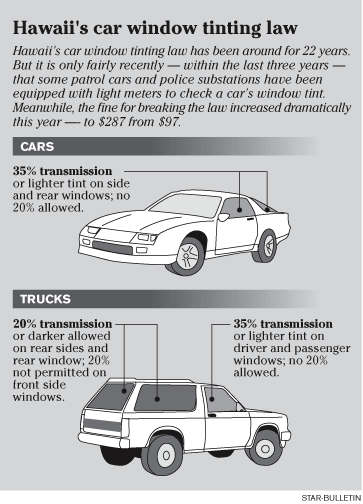Dark car windows
net 9,000 citations
Police armed with light meters
crack down on illegal tints
Hawaii's car window tinting law has been around for 22 years -- plenty of time, police say, for drivers to comply. But more than 9,000 violators have been cited since 2003, a year after patrol cars and police substations were finally issued light meters to check car window tints.
"It is kind of surprising that you still have a fair amount of violators," said Maj. Doug Miller, commander of the Honolulu Police Department's Traffic Division. "No doubt, we are issuing citations for this. There is definitely some enforcement ... but there are still some under the radar that haven't gotten caught."
Now, police officers -- armed with about 100 light meters, up from 20 islandwide in 2003 -- are making a concerted effort to get window tint violators off the streets.
And they also have a new deterrent.
Shedding new light on an old problemMaj. Doug Miller, commander of the police Traffic Division, says citations for window tint violations are on pace to surpass 4,000 this year. Failed vehicle inspections for window tint, meanwhile, will likely top 2,000.
Citations on Oahu issued for window tint violations
Vehicle inspections failed on Oahu for improper window tint *
* Failed inspections can stem from tint that is too dark as well as peeling or bubbling tint or a window distortion. Failures for dark tint alone were not available.
Sources: Honolulu Police Department, city Motor Vehicle and Licensing Division
|
From January to April, the latest month for which statistics are available, police raked in 1,376 tint citations. This year's total is expected to top 4,000 -- up from 2004, when Honolulu police cited 2,934 drivers. In 2003, 4,358 were ticketed for breaking the window tint law.
Six months ago, Al Tod, owner of Al's Tinting in Aiea, was hit with a tinting citation while trying out a new tint film product on his car that, he said, was just outside the legal range. He is not arguing the ticket, but is questioning why illegal tint is considered more egregious than speeding.
"The tinting laws are overpriced," he said last week while working at his shop.
Miller, though, said the tint law is not just about tint. It is about safety.
A tint darker than the law allows makes driving at night more difficult, which could endanger pedestrians and other drivers. Also, "this is one of the violations that directly has a play on officer safety," Miller said, because dark tint makes seeing into a vehicle difficult and could allow a potentially harmful suspect to hide a weapon from an approaching officer.
Even with the higher fine, tinting shops still report getting numerous requests for illegal tinting, which they say they turn down for fear of paying the $537 citation for applying illegal tint.
Under the law, tint shops are also required to reapply legal tint on a violator's car for free or reimburse a customer the cost of the original job.
At T&T Tinting in Salt Lake, anywhere from 20 to 40 people come in every month asking for illegal tint, said customer service representative Jennifer Canianes.
"People know the law and they just want it darker," she said, adding that most customers can be convinced to go legal, while some find a willing tint applier elsewhere. Most illegal tints, she said, are likely put on by friends or relatives -- not in shops.
T&T Tinting gets plenty of business from its next-door neighbor, a safety inspection site.
Drivers come in regularly, asking to have their tints removed after failing vehicle inspections for violating the law, Canianes said. "We've got it made," she said. Tint removal costs about $90.
Between January and April, 865 people on Oahu failed their vehicle inspections because of tinting problems, the bulk of which constitute dark-tint violators, according to city-compiled numbers. In 2004 more than 2,500 failed because of illegal tint, while 2,925 failed for tint in 2003. Other tinting violations that can mean a failed vehicle inspection include peeling or bubbling tint.
The tinting law requires that the driver's and passenger's side windows of all vehicles can block no more than 65 percent of light. No tint is allowed on windshields below four inches from the top. Trucks and sport utility vehicles can have darker tint on their back windows and rear passenger's and driver's side windows.
Opponents of the law say the tinting limits are too strict, especially for cars.
"It's like saying nobody can have curtains on their home," said Jeff Rezents, owner of Military Tinting International on Wilikina Drive. "In their (lawmakers') attempt to save everybody from themselves, they make everybody a criminal. ... I really think they've completely overstepped their bounds."
Rezents and other car tint shop owners have also questioned why certain vehicles, including some police cars, have darker-than-legal tint even though the law provides for no exceptions. He said it sends a mixed message if a tint violator is being ticketed by a police officer driving a darkly tinted car or sport utility vehicle.
Miller, though, said officer-owned police vehicles are subject to the tinting law and are regularly checked.
"If they find some improper tint, we take action against that officer," he said. Miller could not provide details on how many officers have been found to have illegal tints or what kind of administrative action they faced.
Meanwhile, state Transportation Department spokesman Scott Ishikawa said "practical exceptions" are made to the tint law for vehicles used by the FBI, Secret Service, some police detectives and high-level government officials. "We don't go after those groups. Obviously, it's for security reasons, particularly for the high-level security issues," Ishikawa said. "Legally, they're supposed to be no exceptions. We try to make practical exceptions."

E-mail to City Desk
[News] [Business] [Features] [Sports] [Editorial] [Do It Electric!]
[Classified Ads] [Search] [Subscribe] [Info] [Letter to Editor]
[Feedback]
